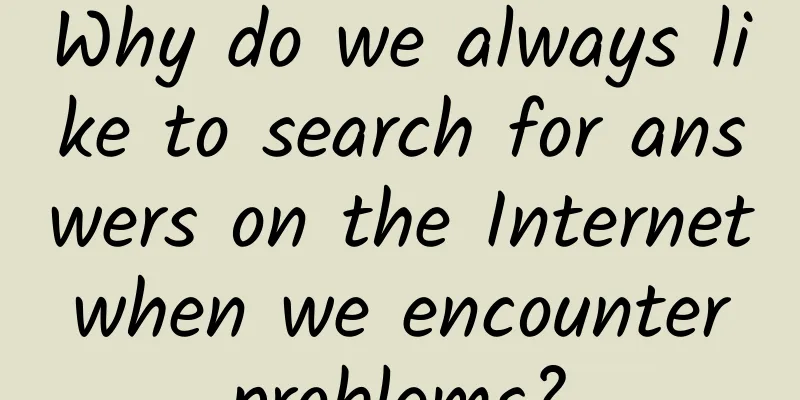Why do we always like to search for answers on the Internet when we encounter problems?

|
In modern society, the Internet has become an indispensable part of our daily lives. Whether it is asking about the weather, answering small questions in daily life, or even buying goods, the Internet has become the preferred channel for people to obtain information. Have you ever encountered a problem and your first reaction was to pick up your phone or computer and open a search engine to search for the answer? In fact, this behavior is not only a convenient reflection of modern life, but also a huge change in the way human society obtains information. So why do we rely so much on online searches? PART 0 1 The Popularization of the Internet and the Change of Information Acquisition Over the past few decades, the popularity of the Internet has greatly changed the way people obtain information. In the era without the Internet, people usually need to obtain information through traditional media such as books, newspapers, television, and radio. This information was often limited by time and space, but now, with the development of the Internet, information can be obtained almost anytime and anywhere. As long as we have a smartphone or a computer and can connect to the Internet, almost any question can be answered quickly. From a scientific point of view, the popularity of the Internet, especially the rise of mobile Internet, has greatly changed our lifestyle. The Internet has made us more efficient, and almost every question can be answered by searching in a few seconds. This convenience has brought great changes to our lives, making "searching on the Internet" a normal way to solve problems. PART 02 How do search engines work? If you often search for questions online, you may be familiar with the term "search engine". Search engines, such as Google, Baidu, Bing, etc., are the "bridge" for us to obtain information. So, how do search engines work? The technology behind search engines is called "algorithms". Simply put, algorithms are rules used by search engines to determine which information is most relevant and useful, so as to present us with the most appropriate search results. This process is divided into several steps: 01 Crawler crawl information Search engines send out "crawlers" (a program) to crawl the Internet continuously and capture information on web pages, including text, pictures, videos, etc. 02 Index creation The information crawled by the crawler is stored and categorized into a huge database called an "index." This index is like a huge library catalog that helps search engines find relevant information quickly. 03 Sorting and recommendation When you enter a question, the search engine will sort the web pages in the index according to the algorithm and recommend the results that best meet your needs. PART 03 Why do we rely on online answers? So why do we rely so much on answers online? From a psychological perspective, people tend to look for quick, direct solutions when they encounter problems. Searching online can give us instant feedback, and this feeling of quickly satisfying needs makes people feel dependent. In addition, answers on the Internet often seem more "down-to-earth" than traditional books or expert opinions. On the Internet, the answers to many questions come from the experience shared by ordinary people, and these experiences are often closer to life and easier to understand. This seemingly "popular" answer gives people a sense of "relevance to me" and makes us feel more trustworthy. However, this trust is not unquestionable. In fact, the quality of information on the Internet varies, and there is even some false information that can mislead us. So, although we tend to believe the answers on the Internet, we should also maintain a certain critical thinking. PART 04 How to improve the efficiency and accuracy of information search? Although online search brings us convenience, if we don’t discern, we can easily fall into the dilemma of misleading information. So how can we improve the efficiency and accuracy of search? Here are a few practical suggestions: 01 Use precise keywords: When searching, try to use accurate and concise keywords. For example, if you want to know "how to treat headaches", you can directly enter "headache treatment methods" instead of the vague "headache". 02 Evaluate the reliability of information sources: Pay attention to the source of information, and try to choose authoritative and professional websites or articles, such as information released by medical and educational institutions. Avoid relying solely on personal blogs or random sharing on social media. 03 Cross-platform comparison information: For important or complex questions, you can compare them on different search engines and platforms to see if the answers from different sources are consistent. If there are any discrepancies, you can further verify them. 04 Focus on time: The answers to some questions may change over time (for example, in the fields of medicine, technology, etc.), so when searching, pay special attention to the release time of the information to ensure that you are obtaining the latest information. PART 05 How to deal with information overload and decision difficulty? Although search engines help us quickly obtain information, one of the problems in modern society is "information overload" . The results of each search are often a huge amount of information, and how to choose the most appropriate answer among the numerous answers has become a difficult problem faced by many people. Psychologists call this phenomenon "choice difficulty syndrome." When we are faced with a large amount of information, we often feel anxious and confused and don't know how to choose the best answer. In this case, we can adopt the following strategies to reduce anxiety: Identify your needs Before searching for a question, be clear about what type of answer you want, for example, whether you want to find a specific solution or understand the context of the problem. Filter information Learn to quickly filter useful information through titles and summaries to avoid being drowned in the "ocean" of information. No more hesitation after making a decision Once you have found the right answer, try to avoid searching again. Trust your own judgment and avoid searching again and again. To some extent, the Internet is not a universal answer library. It is more like a tool to help us obtain information, but the final judgment and choice still requires each of us to think rationally and make wise judgments. In the future, with the continuous development of technology, information acquisition will become more intelligent. How we can use these technologies to improve our cognitive level is still a question worth thinking about. References: Zhang Wenhua. Research on personalized information services based on the Internet: Taking Toutiao as an example[J]. Sound and Screen World, 2024, (23): 114-116. Chen Jianqun, Wang Junyue. Internet methods of information search: significance, shortcomings and countermeasures[J]. Journal of Baoding University, 2018, 31(06): 93-98. Ming Yaxin. How do consumers use the Internet to search for information[J]. Management Modernization, 2017, 37(06): 85-87. Liu D, Yang S, Cheng YC, et al. Online Health Information Seeking, eHealth Literacy, and Health Behaviors Among Chinese Internet Users: Cross-Sectional Survey Study. [J]. Journal of medical Internet research, 2024, 26e54135. Li Jizun. On the profound impact of the Internet on social change and its governance[J]. Business Times, 2006(21):8-10. Yao Bo. Sociological analysis of Internet behavior from the perspective of new media[D]. Shanxi: Shanxi Normal University, 2017. Xu Dashuai. A brief analysis of the future of news dissemination in the mobile terminal media in the mobile Internet era[J]. Speed Reading (Second Half Month), 2016(1):268-269. Yang Zaihua. Research on China's Internet Health Communication[D]. Sichuan: Sichuan University, 2007. Note: All pictures in this document are generated by AI Author: Yang Linjing Popular Science Writer Editor: Dong Xiaoxian Reviewer: Liu Ying, Li Peiyuan |
>>: We boiled 30 eggs in one go so you can peel the perfect egg
Recommend
TikTok has chosen the third path. Is Trump finally going to compromise?
[[342523]] A single spark can start a prairie fir...
To celebrate New Year's Eve, first understand the aroma of sauce before drinking
Mixed Knowledge Specially designed to cure confus...
Huoqiu Flower Mini Program Agent Price Query, How much is the Huoqiu Flower Mini Program Agent Price?
How much does it cost to be an agent for a flower...
A review of the firsts in meteorological history: the "Luyang Silver Pearl" you don't know
In 1996, my country's first new generation we...
6 common "routines" for creating new brands
The recent updates are always opinion articles, a...
Social product methodology: two or three things about product operation
How can operations create short-term user value a...
Case | Investment and franchise advertising cases and effect data!
Today I will share with you an optimization case ...
Why doesn’t Durex pursue Wang Baoqiang?
These two days, Everyone was shocked by a breakin...
Caocao Travel Competitive Product Analysis Report
The convenient business of online ride-hailing ha...
How to create creative copy for TikTok advertising on e-commerce platforms?
Recently, the favorite advertising resource of fo...
It is one of the most dangerous birds in the world, but it has been kept in captivity.
Today we are going to talk about a bird, a beauti...
"White Paper on Large-screen Marketing in the Pharmaceutical and Healthcare Industry" is released, Huanwang helps pharmaceutical brands return to the main marketing position
The pharmaceutical and healthcare industry is clo...
Review of marketing planning cases and the cool advertising in 2019!
• Introduction• "It's fun to be silly fo...
The kidnappers in the Ukrainian bus hijacking case made strange demands and the standoff has lasted for more than 9 hours!
On the morning of the 21st local time, a man in L...


![Ma Ge Python Full Stack + Crawler + Data + AI [2022]](/upload/images/67cc025b8fcc9.webp)






